On Monday, I was preparing some notes for a lecture on section 1 of the Canadian Charter when I was surprised by a set of exuberant knocks on my office door.
“Professor Sigalet. They invoked the Emergencies Act! It’s the first time in history!”
A student was standing at my door. He quickly explained to me that Prime Minister Justin Trudeau had invoked the Emergencies Act to deal with the protesters on Parliament Hill and at various border crossings. He wondered aloud whether the invocation would end up being questioned on federalism grounds in courts like in Re: Anti-Inflation Act (assigned last week), or if uses of the law would be held as unreasonable limits on Charter rights.
I confessed that I wasn’t sure how things would turn out, and that I had never read the text of Act. But the questions couldn’t be more relevant. What a time to teach this stuff.
After reading the Act, and the Order-in-Council invoking it, I think there are at least three big legal and political questions standing out in my mind. First, how much will the statute’s own standards and rules, or federalism considerations, potentially get in the way of federal aims? Second, will the Charter be an effective instrument for hemming in the Act? And finally, what will the political effects of this be on the protesters, the government, and the Conservative leadership race?
But before I sketch some potential answers to these questions, it’s worth reviewing the Emergencies Act. Its predecessor was the famous War Measures Act that was used by Pierre Trudeau in response to the 1970 “October Crisis.” The Front de Libération du Québec (FLQ) was a terrorist group that kidnapped Deputy Premier Pierre Laporte and the British Diplomat James Cross. The Premier of Quebec, Robert Bourassa requested military aid in response to the crisis. Trudeau père’s federal government invoked the National Defence Act, to bring in the military, and declared an “apprehended insurrection” under the War Measures Act, to enable the police to arrest and detain terrorist suspects without respecting civil rights such as habeus corpus. A combination of Laporte’s murder and the successful crackdown helped sink popular support for the FLQ and put an end to the crisis.
But the invocation of the Act had its critics. The federal NDP leader, Tommy Douglas, stated that “the government, I submit, is using a sledgehammer to crack a peanut.” The aftermath saw rising concerns about police abuses of power, particularly regarding the RCMP’s alleged “dirty tricks” and procedural misconduct. Trudeau created the “McDonald Commission” to investigate such abuses of power, and the Commission recommended reforms to laws concerning emergency powers. The Commission was particularly concerned with the unaccountable abuses of police power carried out without the knowledge or oversight of political representatives, and as a result recommended increased Parliamentary oversight.
I made the mistake of trying to read through these reports and was shocked to find the amount of RCMP operations involving unauthorized stings, illegal break-ins, dynamite theft, police barn arson, etc. Let us hope that Canadian conspiracy theorists never read them. The Emergencies Act was then enacted in 1988 to repeal the War Measures Act and reform the law of emergencies along various lines in keeping with some of the McDonald Commission’s recommendations.
The Act authorizes special powers in four scenarios: emergencies of public welfare, public order, international crisis, and war. Such emergencies must either endanger the “lives, health, and safety of Canadians” or threaten the government’s ability to “preserve the sovereignty, security, and territorial integrity of Canada.” Justin Trudeau’s government has declared a public order emergency and claimed that the public order is threatened by blockades in “conjunction” with “activities” supporting “the threat or use of acts of serious violence against persons or property.” The Act authorizes orders restricting public assemblies that threaten to “breach the peace,” government assumption of control over specific places and utilities, and punishment by summary conviction or indictment. It is quite heavy duty.
Some of the limits placed on the government include the need to have both houses of Parliament approve the declaration within seven days, the requirement that emergencies must “exceed the power” of provinces to deal with them, and “cannot be dealt with effectively by any other law in Canada.” The preamble makes assurances that the Act cannot be used to “limit or abridge” fundamental rights protected by the Canadian Charter, the 1960 Bill of Rights, and international human rights law.
Now we can turn back to my big questions. The first question is whether the Act’s own standards and rules apply to the situation at hand. Do we really have a public order emergency that involves activities featuring violence or the threat of violence? Many legal-eagles already have their talons out on this question and are pointing out that the suppression of lawful and peaceful protest is nowhere enumerated in the Act as an emergency. The government appears to be explicitly citing a terrorist threat to national security as its evidence of a public order emergency, and that just doesn’t seem to fit the description of the truckers honking horns in Ottawa. It doesn’t even seem to fit the more unlawful activity, such as the blocking of streets. The border blockades in Windsor, Coutts, etc. seem like a slightly better fit for the security threat description but they have mostly already either been dismantled or mitigated.
Even if every protest presents the threat of violence, it’s hard to imagine how they can be said to be beyond the police powers of the provinces or constitute a threat to the sovereignty and territorial integrity of Canada. Lawyers representing the truckers could also point out that whatever “activities” threaten violence seem quite prosecutable as offences under the criminal code, provincial traffic laws, and municipal by-laws. If a judge finds that existing laws could deal with the situation, then the invocation of the Act could be held unlawful. The government might be able to escape such challenges by arguing that they aren’t justiciable, but that’s a gamble.
The second question is whether the declaration could run up against the Charter. Remember that when Trudeau père invoked the War Measures Act there was no constitutional bill of rights, only PM Diefenbaker’s 1960 statutory bill of rights. It’s worth noting that during the “October Crisis,” the government took the step of enacting a law shielding the use of emergency powers from creative reinterpretation or invalidation by declaring “that this Act shall operate notwithstanding the Canadian Bill of Rights.” And that was to protect the emergency powers from rights enumerated in an ordinary federal law.
By contrast, Justin Trudeau’s declaration seizes many powers that appear to threaten entrenched Charter rights. The ability of police to disperse and restrict otherwise lawful peaceful assembly threatens the Charter section 2(b) freedom of expression and the 2(c) freedom of assembly. Powers of summary judgement and indictment, the latter threatening imprisonment for up to five years, could violate legal rights such as the section 11(d) right to the presumption of innocence and the section 11(f) right to a fair trial. And the declaration’s assumption of the power to “regulate or prohibit” private transfers of funds to protesters, including the ability to mandate the reporting of such transfers, could raise challenges under the section 8 right to be free from unreasonable search and seizure. And so on. If the government uses its powers to target lawful activities protected by these rights, then Trudeau’s government will either need to justify “reasonable limits” on rights, another roll of the dice depending on the political morality of judges, or else to follow his father’s example and enact a law invoking the section 33 notwithstanding clause to protect the use of such emergency powers from judicial review.
Finally, there is the question of how all of this will shake out politically. The answer is opaque, partly because it depends on how the law shapes events. It’s possible that reaching for the Emergencies Act is not only legally questionable, but also tactically mistaken, because the internal limits and Charter implications of the law will make it an easier target for lawyers. With more lawyers drawn to their cause like hornets drawn to raw meat, the protesters who previously made constitutionally illiterate and undemocratic demands could start to gleam with the white light of constitutional principle. That might draw out the battle for control over the streets of our capital. On the other hand, if the government moves swiftly enough, litigation will take too long to do the protesters any practical good and legal concerns about their treatment will be post hoc or moot.
Politically, Trudeau may have given the protesters a new varnish of respectability in the eyes of many Canadians who cherish civil liberties, and he may be risking the Liberal Party’s reputation as the “Charter Party.” He may also have further proven them right, at least in their own minds, about the illegitimacy of his government’s overreach. Maybe maintaining the rule of law is worth these risks in the prime minister’s calculations. Keep in mind that it’s possible for the Liberals to sacrifice their reputation as the part of the Charter while earning new spurs as the party of law and order. But judging by how the government meekly responded to the toppling of statues and burning of immigrant churches last summer, they aren’t exact hoping for a mandate as the new sheriff in town.
As for Her Majesty’s Loyal Opposition: the Conservatives are in leaderless disarray, with Pierre Poilievre having bet his leadership bid and, if he wins, his party’s electoral chances, on Canadian sympathy with the protesters. Poilievre’s move always had the potential to tie any violence or disorder around the neck of a party that has styled itself a protector of the rule of law since the days of John A. Macdonald. Trudeau’s invocation of the Emergencies Act gives Poilievre an opening to characterise the protesters as standing for the constitutional rule of law in the face of a government keen on overriding fundamental rights. If that plays out to his advantage the result could be that the Conservative Party becomes something it has long resisted and critiqued: the Charter Party.
My students have every reason to be excited about studying constitutional politics during such interesting times. Whether that is a blessing, or a curse, depends on how the sledgehammer hits the peanut.
Recommended for You

How Donald Trump sees the world as a giant game of Risk

Canadians lost confidence in Parliament at end of Justin Trudeau’s prime ministership: Statistics Canada
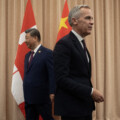
‘All risk and no reward’: The Roundtable on why Carney’s China trip is a really big deal
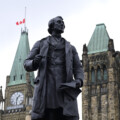
Mark Carney’s spelling and the ghost of Sir John A. Macdonald
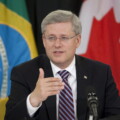
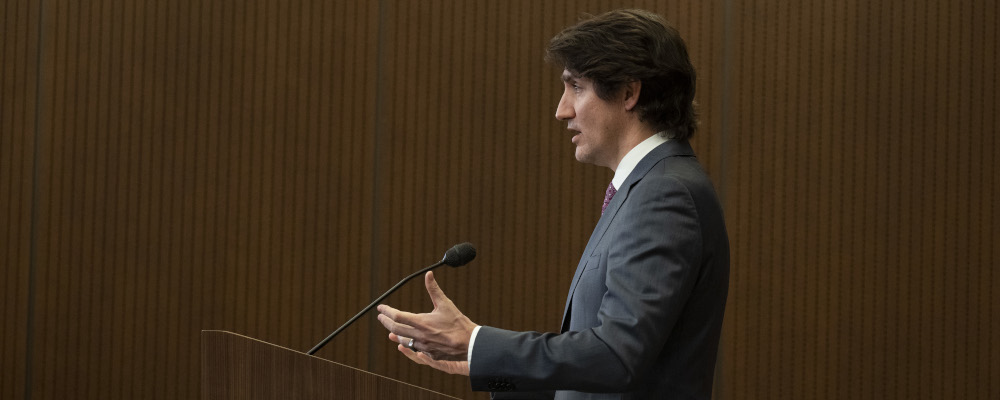
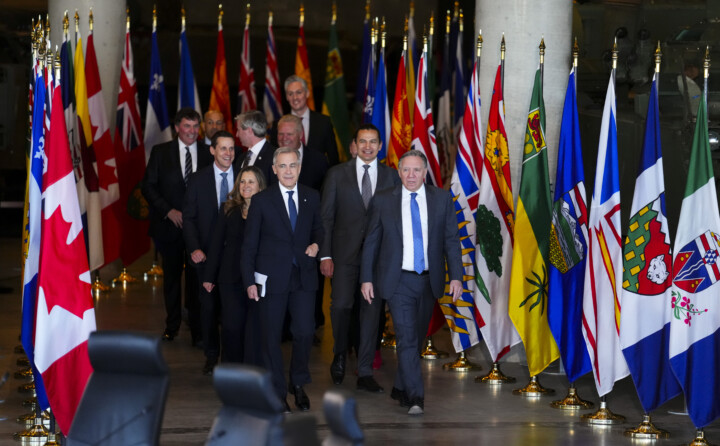

Comments (0)